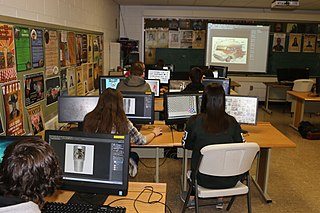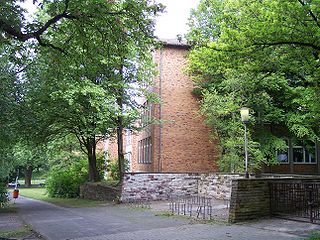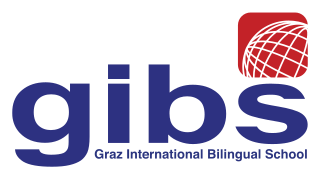
Gymnasium is a term in various European languages for a secondary school that prepares students for higher education at a university. It is comparable to the US English term preparatory high school. Before the 20th century, the gymnasium system was a widespread feature of educational systems throughout many European countries.
Abitur, often shortened colloquially to Abi, is a qualification granted at the end of secondary education in Germany. It is conferred on students who pass their final exams at the end of ISCED 3, usually after twelve or thirteen years of schooling. In German, the term Abitur has roots in the archaic word Abiturium, which in turn was derived from the Latin abiturus.

Matura or its translated terms is a Latin name for the secondary school exit exam or "maturity diploma" in various European countries centered around the former Austro-Hungarian Empire, including Albania, Austria, Bosnia and Herzegovina, Bulgaria, Croatia, Czech Republic, Hungary, Italy, Kosovo, Liechtenstein, Montenegro, North Macedonia, Poland, Serbia, Slovakia, Slovenia, Switzerland and Ukraine.

Education in Germany is primarily the responsibility of individual German states, with the federal government playing a minor role. Optional kindergarten education is provided for pre-school children, after which school attendance is compulsory.

In France, secondary education is in two stages:
Education in Slovakia consists of a free education system based on 10 years of compulsory school attendance.

A state school or public school is a primary or secondary school that educates all students without charge. Such schools are funded in whole or in part by taxation.

Kerpen is the most populated town in the Rhein-Erft-Kreis. It is located about 20 kilometres southwest from Cologne. As of 2022, Kerpen has a total population of 69,530.
Tenth grade is the tenth year of formal or compulsory education. It is typically the second year of high school. In many parts of the world, students in tenth grade are usually 15 or 16 years of age.
Eleventh grade is the eleventh year of formal or compulsory education. It is typically the third year of high school. Students in eleventh grade are usually 16-17 years of age.

Twelfth grade is the twelfth year of formal or compulsory education. It is typically the final year of secondary school in most parts of the world. Students in twelfth grade are usually 17–18 years old. Some countries have a thirteenth grade, while other countries do not have a 12th grade/year at all.

Real school is a type of secondary school in Germany, Switzerland and Liechtenstein. It has also existed in Croatia, the Austrian Empire, the German Empire, Denmark and Norway (realskole), Sweden (realskola), Finland (reaalikoulu), Hungary (reáliskola), Latvia (reālskola), Slovenia (realka), Serbia, and the Russian Empire, including partitioned Poland.

Gymnasium, in the German education system, is the most advanced and highest of the three types of German secondary schools, the others being Hauptschule (lowest) and Realschule (middle). Gymnasium strongly emphasizes academic learning, comparable to the British sixth form system or with prep schools in the United States. A student attending Gymnasium is called a Gymnasiast. In 2009/10 there were 3,094 gymnasia in Germany, with c. 2,475,000 students, resulting in an average student number of 800 students per school.

The Hildegardis-Schule is a secondary school in the city of Bochum, Germany.
Education in Croatia is a right defended by Article 66 of the Constitution which states that everyone is entitled to free compulsory education under equal conditions and in accordance with their aptitudes. Education is mandatory for children aged 6 to 14.

The Graz International Bilingual School (GIBS) is an Austrian bilingual (English/German) university preparatory semi-independent charter school Gymnasium in Graz, Austria. The school mainly focuses on languages, offering German, English, Russian, Latin, French and Spanish. Students graduate with the Austrian Matura, the IB Diploma or with both, assuming that they meet the criteria necessary.

Albert-Einstein-Schule was a Gymnasium for boys and girls from grades 5–13 in Bochum, Germany. It had about 900 students. Just south of downtown Bochum, the school was in the Wiemelhausen section of town and shared a campus with the Hans Böckler Realschule. The school had an emphasis in natural science and English. It had a bilingual program, where some classes were taught in English, rather than German. In 2008, the school was certified as a "Europaschule" (de) by the Ministry of Schools of North Rhine-Westphalia. The school held its final day of classes on 14 July 2010.
Hans-Dietrich-Genscher-Gymnasium Halle is a secondary school (gymnasium) in Germany. It was established in November 1908. Currently, about 600 children attend the school. The school is situated right in the city center of Halle an der Saale and is widely known for its two educational profiles: German secondary school and bilingual English-German profile. In 2009 the school celebrated its 100th anniversary. The school is named after Hans-Dietrich Genscher, a German politician.

Stadtgymnasium Detmold is a Gymnasium in Detmold in the German state of North Rhine-Westphalia. Founded in 1830, Stadtgymnasium Detmold is the second oldest Gymnasium in Detmold.
















